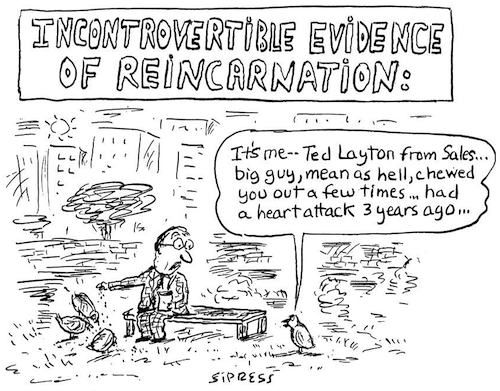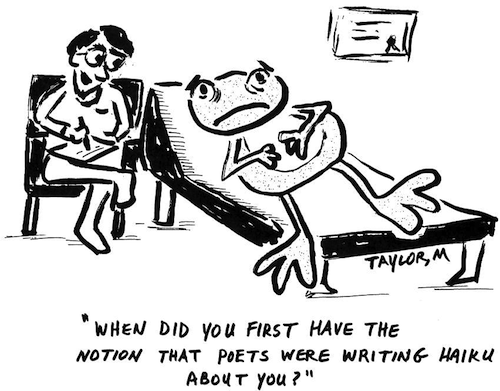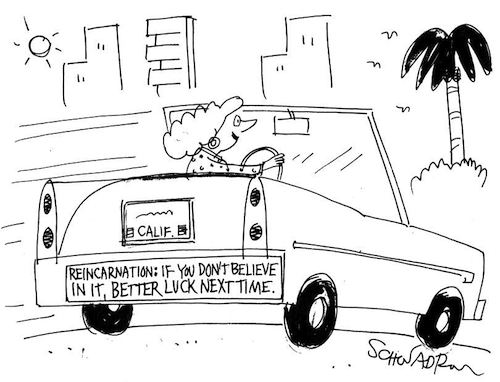Will the Real Buddhist Please . . .
I was troubled by the implications of the interview with Robert Thurman and Stephen Batchelor (Tricycle, Summer, 1997). Batchelor is obviously taking the Buddha’s words to heart by questioning what he doesn’t know in himself as truth and by not accepting any doctrine on blind faith. No problem there. However, when a man in a position of power and influence, someone many may look to as a teacher or leader in Western Buddhism speaks out and writes interpretive books on Buddhism without the inner signs of experiential realization, it is downright dangerous. It is a mistake for educated westerners to believe their philosophical understanding gives them the authority to go public on what they think the Buddha taught. Thurman says anybody can be a Buddhist. I would say, anyone can put a label on themselves that says “I am a Buddhist.” But without a correct view it is impossible to be a Buddhist. Padmasambhava wrote very precisely that agnosticism, hedonism, eternalism and nihilism were fallacious views contrary to Buddhism. If Batchelor wants to be attracted to agnosticism, fine. However, when he uses the Buddha’s name to support his personal biases, can he not see that he is contributing to the “death of the dharma” by preaching a dharma that is no longer authentic and true? My advice for someone who says “I don’t know,” is that they best spend their time sitting on a meditative cushion and carefully following the instructions of a realized teacher until their own inner signs manifest. This is the meaning of being a Buddhist. Everything else is pure speculation.
Lidian L. King e-mail
e-mail
I am one of those nihilist materialists that Professor Thurman refers to so patronizingly in his portion of the debate on reincarnation. Trained as a scientist, I became a Buddhist because I thought I had at last found a deeply spiritual path which made a virtue of “don’t know mind” and did not require that I give up my critical sensibilities. In this I experience Buddhism as thoroughly modern despite its centuries long tradition.
When I look up into a star filled sky or behold tiny creatures swimming in a drop of pond water, I find all the sense of continuity that I need to sustain my commitment to “save all sentient beings.” I would prefer that Professor Thurman stick to his own experience and not define mine as “less than.”
Stephen Karakashian
New York, New York
In your Summer 1997 issue, two letters to the editor, and Robert Thurman in “Reincarnation,” criticize Stephen Batchelor for wanting good logical or empirical reasons to believe in traditional Buddhist beliefs. They say that Buddhists should accept these beliefs on trust, because they’re good for practice. If Buddha or Nagarjuna, etc., believed something, we should believe the same thing.
Maybe they’re right. Then good Buddhists should accept either all or some of the traditional beliefs. Suppose you accept all of them. Then you believe that matter consists of a few elements, that Mt. Meru is the center of the earth, etc. You don’t believe in spaceships, but you are a flat earther!
Suppose you decide to pick and choose. You settle on a certain group of traditional beliefs and accept those. How do you—if you are a reasonable person—make that decision, if not by finding good logical or empirical reasons for accepting the beliefs in that group? But then, isn’t that Batchelor’s position?
Peter Eggenberger
Oakland, California
I found two letters in the Summer 1997 issue chastening Stephen Batchelor to be reminiscent of fruitless conversations that I have had with Jehovah’s Witnesses. Similarly, Robert Thurman took such leaps of logic in his debate with Batchelor on reincarnation (i.e., inferring that reincarnation makes so much plain good sense as a goad to practice that it has to be true) that his position suggested fundamentalism.
The fundamentalist insists that his religion, sect, or belief is the ONLY true way, period. It is a certain blessing to find your own “path with heart” and there is no doubt that unwavering faith will service an individual’s spiritual progress, but it borders on avarice to insist that everyone else in the world trod the same track. This is the root of the rampant intolerance that has plagued humanity for eons.
I don’t think that we truly need everyone else to corroborate our beliefs by assent in order for them to be completely true and valid for ourselves. We have to embrace the concept that the universe of the spirit is more spacious and multifarious than imaginable. Otherwise, we have created a lonely world of parallel enlightenments: the Desert Fathers, the Zen Buddhists, the Hasidic Jews, the Sufis, the Native American elders, the yogis, the Benedictine nuns, the sublimely peaceful grannies sitting in sunny doorways—no connection. In truth, they will all arrive at the same place with or without reincarnation.
Susan Byers Willits, California
Willits, California
Tibet v. Tibet
Regarding the “Murder in Dharamsala” news item in the Spring 1997 issue I would like to make the following comments.
Killing people is very bad and I utterly condemn these appalling murders, but why were only the followers of Dorje Shugden suspected? By reading the letter addressed to His Holiness the Dalai Lama known as the �Mongoose Canine Letter,’ widely circulated within the Tibetan exile community, we can clearly understand that H.H. the Dalai Lama has many enemies.
Concerning H.H. the Dalai Lama’s view that Dorje Shugden is a divisive force that endangers both the cause for a free Tibet and also his long life, it has been reported in many newspapers, that in reality H.H. the Dalai Lama is not working for Tibetan independence, but merely for autonomy under Chinese rule. I would therefore like to ask H.H. the Dalai Lama what he means when he says that it is Dorje Shugden who endangers the cause for a free Tibet? Further, what evidence does H.H. the Dalai Lama have for saying that the worship of Dorje Shugden harms Tibetan independence?
Holy Buddhist scriptures say that those who go for the refuge sincerely to Buddha, Dharma and Sangha will not receive any harm from spirits. If this is so, then why is H.H. the Dalai Lama so worried about spirits endangering his life.
I do not accept H.H. the Dalai Lama’s view that Dorje Shugden is a harmful spirit. We believe that Dorje Shugden is a Wisdom Buddha who has great love and compassion for all beings. Dorje Shugden is a Protector Deity of both the Sakyapa and the Gelugpa traditions. With valid reasons we believe that he is a manifestation of Wisdom Buddha, and we engage in the practice of worshipping Dorje Shugden in order to develop wisdom realizations. This is our right, our freedom.
Geshe Kelsang Gyatso
Spiritual Director of
New Kadampa Tradition
Cumbria, United Kingdom
In the Beginning
Somehow I can’t help thinking that, hidden among the affluent Caucasians who seem to comprise most of your readership, there must be a few minority wage slaves who have taken refuge and are wondering if it really takes all that spare time and money in order to be a “really good Buddhist.” It certainly seems so at times, what with the lavish advertisements for “dharma goods,” “retreats,” “holistic financial planning,” “ergonomically and spiritually correct meditation benches,” and the like. Where are the poor Buddhists? Are there Buddhists out there without college degrees? Without $80,000-a-year jobs? Are there any of these people in America? Any non-Asians, that is? Perhaps I should eschew all contact with “PC-Buddhist” media and just look for people who have lived Buddhism in the unglamorous Third World fashion in which it is lived throughout most of the world. No $400 lapis lazuli malas. No $40,000 thangkas. No two month retreats to fabulous secluded retreat centers. No collection of expensive initiations bestowed by celebrity lamas. No stuff. Just no-frills, po-folk’s Buddhism. Kinda like the way it started, I’m thinking.
Laurene Peterson
Seattle, Washington
Change Your Mind
I attended Tricycle’s fourth annual “Change Your Mind Day” in New York’s Central Park on May 31, 1997 (see “In the News”). My doubts about the use of the phrase Change Your Mind took on some significance when I listened to Ven. Kurunegoda Piyatissa speaking about impermanence as the most important aspect of Buddhist philosophy. If, in the state of impermanence, everything including mind changes, are we asking people to speed up changing their changing minds?
P. P. Lakshman
New York, New York
Hook, Line, and Sinker
“Zen Flies,” excerpted from Dickson Schneider’s new book, stole the thunder that I had arrogantly and ignorantly thought might someday be mine. As a Zen fly fisherperson still not wholly satisfied with the transition to the catch-and-release ethic, I’ve been working for some time on the concept of not just a barbless hook (already long popular), nor simply a hookless hook (one of Dickson’s four examples of Zen flies), but of a pointless hook. This would require the cooperation of a fish-hook manufacturer willing to place a small ball at the business end of the hook in place of the standard point and barb. Properly balanced and compassionately hand-tied, such a Pointless Zen Fly (PZF) would still afford the purist (and purest) Zen fisherperson the thrill of the well-placed cast, and the peak experience of duping the risen trout. On those rare occasions when the cast was indeed the perfect presentation of the whole, perhaps the noble trout might honor the angler by holding onto the PZF’s ball for awhile and giving a good, though only symbolic, fight!
 Tom Long
Tom Long
Scottsdale, Arizona
Corrections
The Dharma Center Directory in the “Buddha on the Rio Grande” special section of Tricycle, Summer 1997, listed an incorrect address and telephone number for Upaya in Santa Fe. The correct address is 1404 Cerro Gordo Road. The telephone is (505) 986-8518.
The Dharma Center Directory was not intended to be a comprehensive list of all the regions’ centers. The following centers, however, have asked to be listed: